If you plan on doing business these days, even as a side hustle, you need a website. While Instagram and Facebook will connect potential customers with your products or services, there's nothing like a stable and dedicated Web address you can point clients to. Large companies devote entire budgets to professional websites and/or have development teams working exclusively on them.
You don't have to go that far: These days, even the smallest startup can easily and affordably launch a Web presence. In this guide, we'll show you how, and let you know what to pay attention to along the way.
Why Does My Business Need a Website?
If business is booming and/or you've made it this far without one, you might be wondering why you need a website. That's a fair question and has a few good answers:
Customers expect it
Studies show that 70-80% of people research small businesses online before paying a visit or buying from them. Should you not have a website, these potential customers will likely get what they're after somewhere else, maybe even from your competitors.Present your business on your terms
You might think a website is unnecessary since you already enjoy a healthy Facebook, LinkedIn, and/or Instagram presence. On social media though, you're subject to the whims of the masses. With a website, however, you have full control over your message, making it possible to show off the best features of your business.Gain new customers and expand your reach
If you have your own website, you'll appear in search engine results, like those from Google. Potential customers, who you might never have encountered through other channels, can connect with you and your offerings in this way. In turn, your presence can exceed the local, helping your business to become a regional, national, or even international one.Maximize your opening hours
Unlike brick-and-mortar shops, online businesses never close meaning that orders can be placed around the clock. As an added bonus, websites are a great way to clearly and helpfully inform your customers about your policies, reducing the number of queries directed at your customer service.Compete with rivals - of all sizes
When given the choice, most shoppers prefer buying from smaller, local businesses. Unfortunately, national and international traders enjoy an unfair advantage thanks to their more highly ranked and easier-to-use websites. With a well-conceptualized online store, you can stake out a corner of your local or regional market (since search engines like Google pay close attention to these criteria).It's both affordable and easy
One of the best arguments for creating a website is asking yourself, "Why not?" Making a professional website has never cost less or been easier, so, what are you waiting for?
How Can I Create a Website for My Business?
If you've determined that your business needs a website, you have three options: You can program it yourself, contract the job out to pros, or use website-building software.
Should you possess the coding and Web design skills necessary to create a website, chances are that you've already stopped reading. For everyone else, there are two options:
Have a Website Created for You
Assuming that you lack programming knowledge, but have very clear ideas about what your website should look like and a sizable budget, why not allow pros to handle it for you? There are two main options:
Agencies: These take care of the planning, design, and publishing of a website, offering a variety of related services on the side. Both their size (in terms of staff) and quality mean that you'll pay a premium.
Freelancers: If you don't have a blank check, these offer a more affordable alternative to agencies, since you'll only be dealing with an individual. Still, it's important to find the right person, capable of bringing your vision to life and willing to communicate with you every step of the way.
How to Find Agencies/Freelancers?
There are dozens of online platforms where you can find eager freelancers and agencies. Among the most well-known are Upwork and Fiverr. You'll be able to specify what you're looking for by searching for "small business website", and limiting hits by price or other filters. Payments are made directly through the platform, which takes a cut before passing the rest on to the freelancer or agency you've hired.
Of course, you could also search for a freelancer or agency via Google, and seek out those that specialize in working with small businesses, or who are from your area.
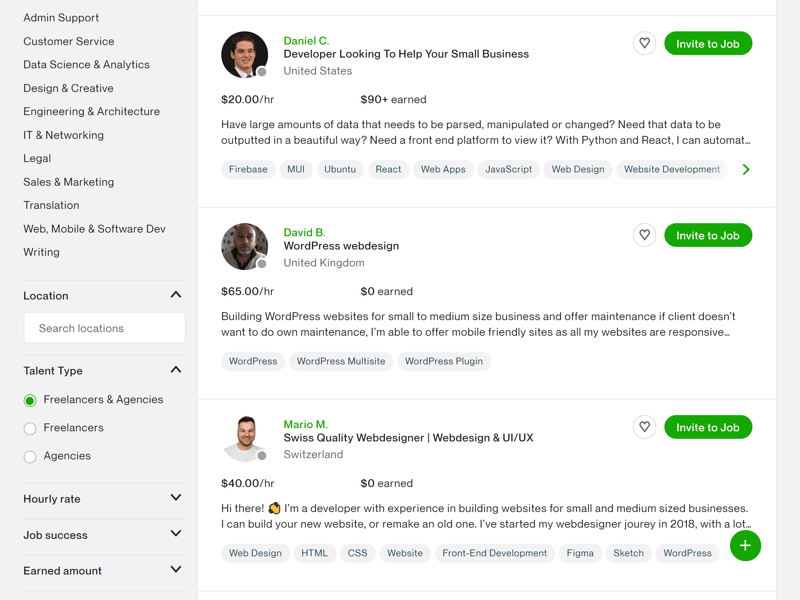
On freelance platforms like Upwork, you can look for those with experience in designing small business websites.
How Much Does an Agency/Freelancer Cost?
Depending on the freelancer or agency, costs can range from several hundred to tens of thousands of dollars. We recommend against trying to cut corners if going this route since your end product will be a high-quality, long-term investment in the future of your business.
Especially on platforms like Upwork, you'll likely come across unbelievably attractive offers, however, we strongly caution against letting the price tag guide your choice. With lower costs often come compromises in other areas, such as quality, willingness to work, and/or poor communication.
Also, freelancers can and do work from anywhere with an Internet connection and electricity, so don't assume that their standards are the same as those in your home country or that of your target market. If this contrast comes to light after your website goes live, it can adversely impact your reputation or standing.
Have a Website Created for You: Advantages and Disadvantages
100 % flexibility: With pros and an unlimited budget, anything is possible: Your website can be tailored to your exact preferences.
Big selection: There's an abundance of freelancers and agencies, making it a buyer's market for those looking to create a website.
Work with pros: By contracting your website out to professionals, you can touch base at any time to ask questions, see how things are going, or make changes.
Expensive: Good Web designers and developers don't come cheap, especially since they're always in demand. The further down market you shop, the more compromises you'll likely have to make.
No guarantee of quality: Not every freelancer or agency is capable of delivering exactly what their client wants. To be fair, it can be difficult or nearly impossible to bring someone else's vision exactly to life. For that reason, don't be surprised if you end up paying a lot for an end product that you aren't entirely satisfied with.
Create a Website With a Site Builder
Website builders offer another option for your small business. These are great especially if you don't have any knowledge of coding or programming. With these user-friendly, online platforms, you'll be able to manipulate and adjust ready-made content blocks visually without having to write a single line of code.
Site Builders: Advantages and Disadvantages
Affordable: Website builders are among the most reasonably priced site creation tools out there. Prices do vary from platform to platform, however, for about $10 a month, you should be able to get a website, hosting, and a unique domain.
User-friendly: You won't need any coding or Web design knowledge, making it possible for anyone to create a website.
All-in-one: Website builders usually take care of everything for their users, from web hosting to your domain, to security certificates, and much more. This allows you to focus solely on your content.
Less flexibility: Not every element can be placed exactly where you might want it, depending of course on the features and design options that your website builder offers. Customization is somewhat limited as a result.
Technical shortcomings: In terms of loading speed or search engine optimization (SEO), website builders have some deficits.
Bland results: Since it's difficult to break out of the design template mold without additional coding skills, your business's website might wind up looking like dozens of others.
Top 3 Website Builders for Small Businesses
In our EXPERTE.com review, we thoroughly assessed 12 website builders. Below, we'll present our Top 3 choices for small businesses:
Wix Website Builder: EXPERTE.com's Winner

Wix won our EXPERTE.com review, offering the best all-arounder on the market. The platform combines a nice variety of features, user-friendliness, and top-notch support into what we feel is a nearly unbeatable package.
Particularly appealing for those looking to create a small business website are testimonials, contact forms, and other ready-made content elements. In terms of ecommerce and marketing, Wix also cuts a fine figure.
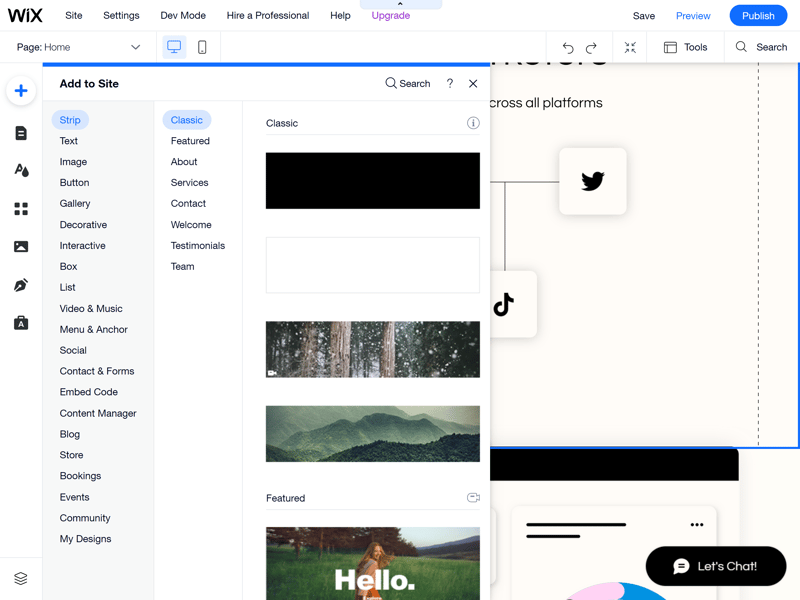
Wix was the best performer in EXPERTE.com's review series, and is worth looking into for small business websites.
In addition, Wix has two editors: Along with its regular one, the platform offers a simplified, AI-assisted editor for beginners. As might be expected, the latter (ADI editor) severely limits customization options, so we advise using the former. Even for newcomers, the standard editor isn't too tricky.
And should the features that Wix comes with out of the box not provide what you need, you can check out the platform's app market, which includes seemingly endless numbers of extensions and add-ons.
If you're interested in seeing exactly what it's like to build a website with Wix, be sure to have a look at our step-by-step guide.
User-friendly editor with free drag and drop
Lots of features and content elements
Numerous design templates
Templates can't be swapped out after you've started building with them
ADI Editor is too rigid, even for beginners
Squarespace Website Builder: Stylish Design for Small Businesses

In comparison to Wix, with Squarespace, you'll be more tied to the platform's design presets. However, the templates are eye-catching: Squarespace actually made a name for itself with its striking and elegant templates, which have helped to elevate thousands of businesses in the digital sphere.
New content blocks are added as "sections" and include key elements like contact forms, FAQs, or team pages, as well as branch-specific content like tour information or reservations.
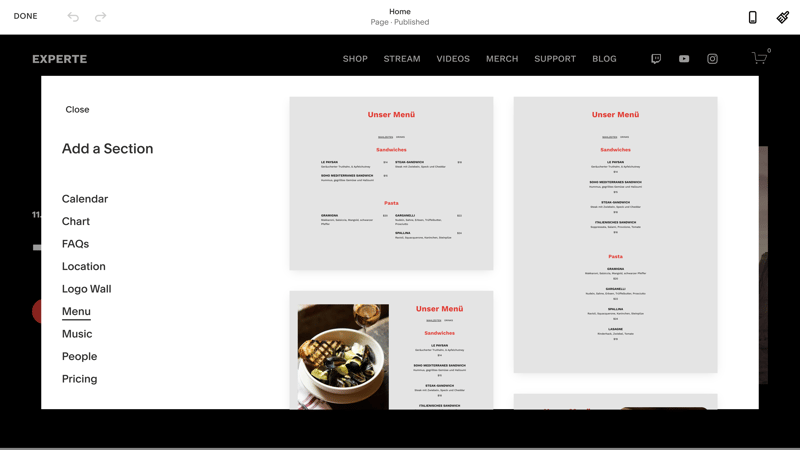
Your Squarespace website will be composed of ready-made sections that you can personalize.
Supposing that your business is working internationally, we should point out that Squarespace doesn't handle the creation of multi-lingual websites as elegantly as other platforms. In addition, it lacks a true app market, offering only a few extensions.
Eye-catching templates
Solid help center and support featuring live chat
Easy to use
Templates can appear too similar to one another
Multi-lingual sites are difficult to set up
Lacks a real app marketplace
IONOS Website Builder: Complex, but Flexible

MyWebsite by IONOS is a bit more complicated to get a feel for than the other platforms we've introduced above, however, learning to use it will pay off: Based on Duda, you can seriously customize your website, personalizing each content element to your exact preferences.
Creating multi-lingual websites is straightforward, and in terms of ecommerce, IONOS cuts a good figure. All content blocks important for small and large businesses are offered.
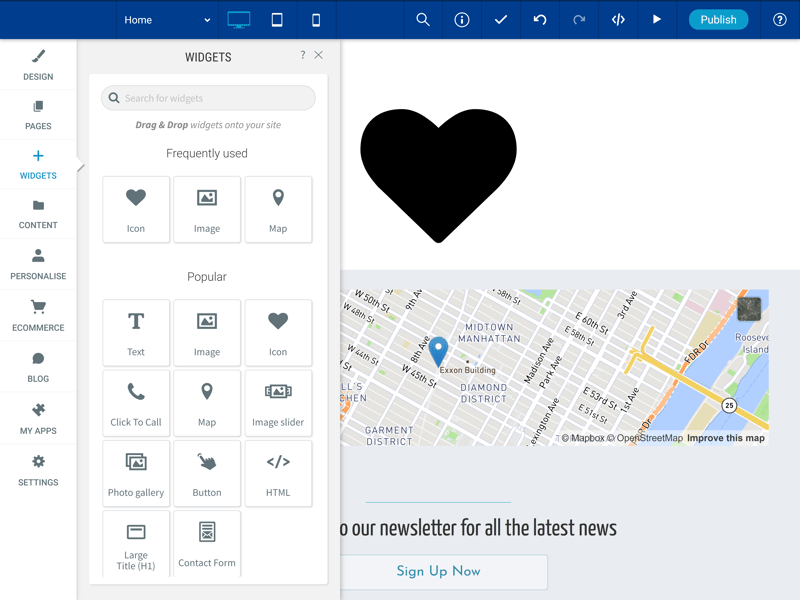
IONOS's editor takes somewhat more time to get accustomed to, however, it offers unparalleled customization.
Personalization is important since the design templates IONOS offers weren't as appealing to us as those of its competitors. It's also disappointing that IONOS doesn't have an app marketplace.
Powerful editor allows comprehensive personalization
Lots of features
Bland templates
Somewhat complicated to use
Which Elements Does a Small Business Website Need?
Your website should be a reflection of your taste and preferences, however, these aspects are a must for your small business page:
Inviting Homepage
Your homepage is your digital shop window and where your visitors will first connect with your business. Make sure that they feel welcome and encouraged to have a look around by clearly presenting which products or services you offer. Finally, try to provide some information about what separates you from your competitors.

Your homepage should both welcome and wow your visitors.
Don't plaster your homepage with generic stock photos, meaningless phrases, or huge blocks of text. Instead, use high-quality visual material and proven ad or marketing copy. First-time shoppers want to get to know the business they're intending to work with and what they have to offer. As such, try to look at your homepage through their eyes.
Intuitive Navigation
Visitors should be able to easily find whatever they're looking for on your website. This requires intuitive navigation menus that divide your website into logically organized pages and subpages.
Most website builders make it easy to create navigation menus and automatically add new pages to them. At the same time, don't overload your navigation menus or bury important information on subpages.

Do your visitors a favor and make sure that your website's navigation menus are easy to use and efficient.
Services
What exactly are customers looking for from your business - and how much do your goods or services cost? Help visitors by clearly presenting your services or products along with their price tags.
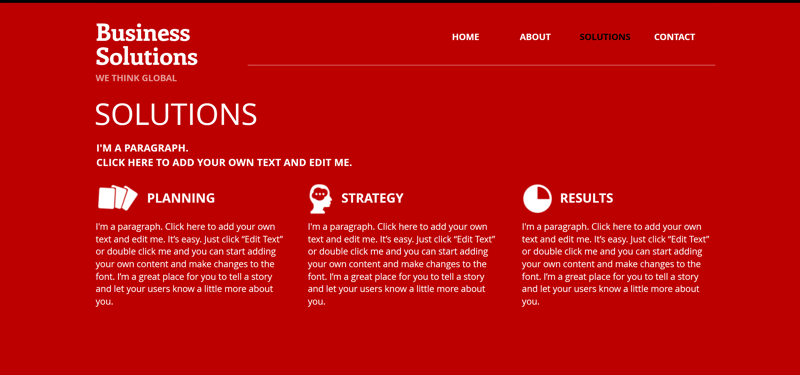
What exactly does your business do?
About Us Page
Keep things simple on your homepage. Your business's origin story and its corporate mission have their place, and it's on your About Us page.
Those who click on this page want to know more about your business, your team, and who you are. Make sure that the information is current, accurate, honest, and relatable. After all, the end goal is to leave a good impression.
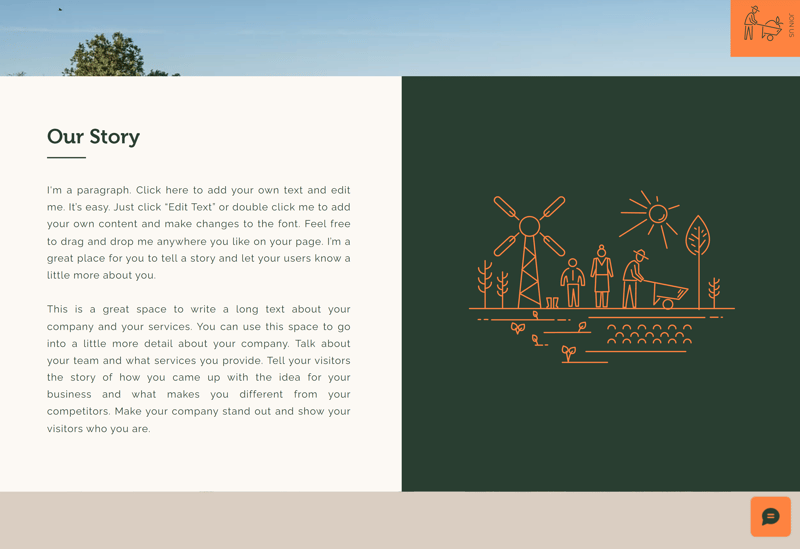
Introduce your team, business, and/or mission statement on your About Us page.
Contact Page
Let visitors to your site know how they can get in touch with you. Website builders offer ready-made contact pages, meaning that all you'll have to do is supply a current email address, phone number, or other information. Such forms can usually be customized to your exact needs.
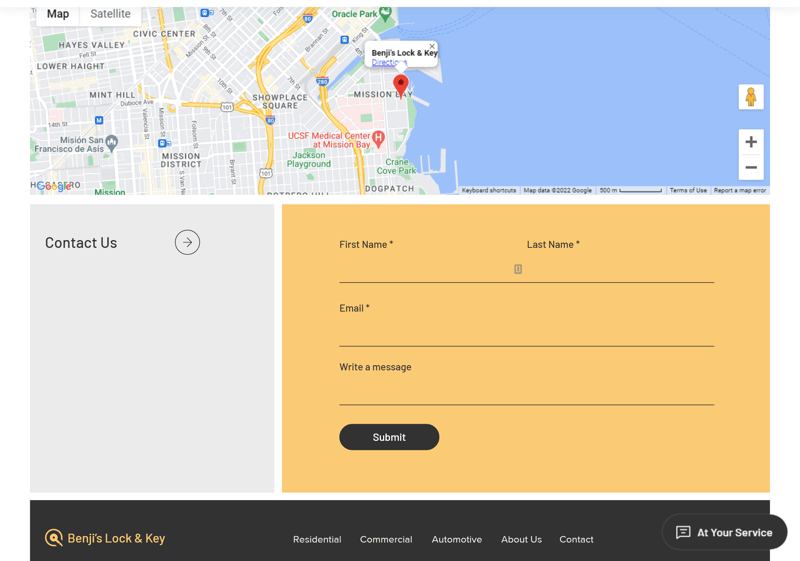
The Contact page on your website should be relatively easy to find and include current information.
Customer Reviews
Testimonials and reviews are one of the most valuable resources for potential customers that are unfamiliar with your business. Don't downplay these, as they show off what you've accomplished and how customers have reacted to it. Make sure to get your client's permission to use their reviews and/or name when promoting your goods or services.
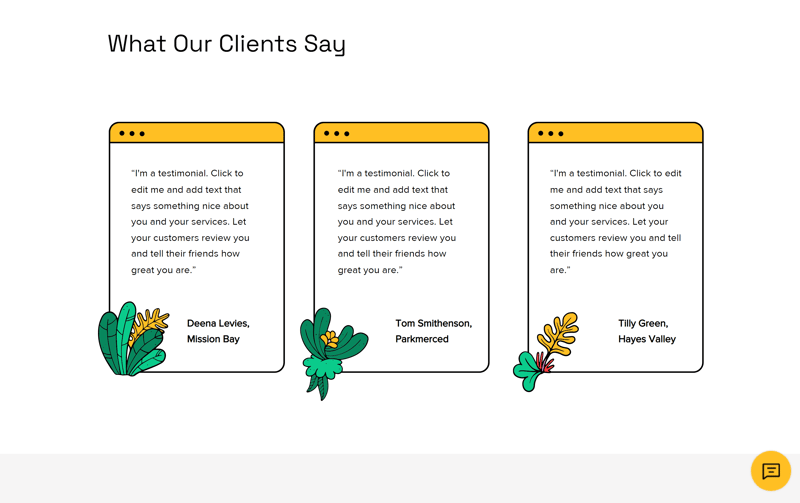
Reviews and testimonials are an important selection criteria for potential customers.
Imprint & Privacy Policy
Then there are a few pages that relate to legal aspects of running a business online, namely, the Imprint and Privacy Policy.
If planning to do business in the European Union, you might be legally required to have an imprint. This should include your business's name, your full name, the business's address, and contact options (telephone number and email address). Depending on what sort of business you're operating, this can vary.
Privacy policies are also legally required according to the EU's General Data Protection Regulation (GDPR). This must specify what you will do with the information visitors to your site leave behind. A suitable policy could be drawn up by your legal representative, or, you could use one of the samples that are available online.
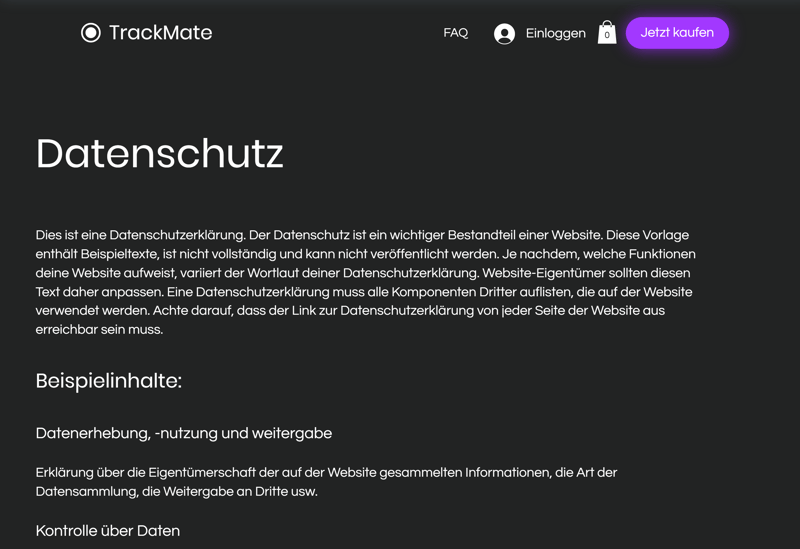
If you're doing business in the EU, your website needs an imprint and a privacy policy.
Create an Online Store: Sell Digitally
Do you want to market your goods or services online? You can with most website builders, however, you'll need to purchase an ecommerce subscription, which can cost a bit more than the standard plan. Businesses focused on selling online can also take advantage of dedicated platforms like Shopify: Alongside classic website-building features, these offer comprehensive dashboards for managing your products, payments, and shipping.
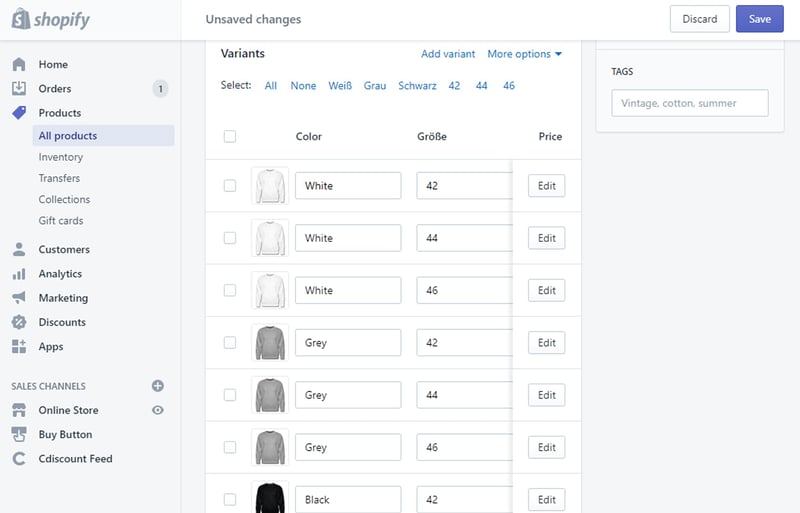
Ecommerce platforms like Shopify are specifically designed for setting up online stores.
To see how to set up an online store and find out which ecommerce platform is best, be sure to consult our EXPERTE.com guide.
Conclusion
Websites are a must these days, even for small businesses. If you can't code, don't worry, you can contract the job out to an agency or freelancer, or give things a go yourself with a website builder.
While expensive, paying pros to build a website for your business gives you maximum flexibility, freedom, and control over how the final product looks. Website builders, on the other hand, cost much less and are easy to use, even for beginners with no coding knowledge. Still, what you'll be able to achieve depends on which platform you use. Among the best choices for small businesses are Wix, Squarespace, and MyWebsite by IONOS.
Comprehensive reviews for both website builders and ecommerce platforms are available on EXPERTE.com.
FAQs
You could program your website yourself from scratch, contract the job out to freelancers or an agency, or use a website builder. Website builders are affordable and accessible, especially if you don't have programming knowledge, but they do limit creativity. Wix, Squarespace, and MyWebsite by IONOS are among the best solutions. Freelancers or agencies are much more expensive, but give you total control.
If using an agency or freelancer, depending on how much they charge, and how extensive your website should be, the price can range anywhere from $1,000 to $20,000. Website builder subscriptions, on the other hand, cost around $10 per month, with ecommerce plans slightly more expensive.
Your business's website should have a striking homepage, clear navigation menus, an overview of what products or services you offer, a contact page, and customer reviews/testimonials. If doing business in the EU, you'll also need an imprint page and privacy policy.












